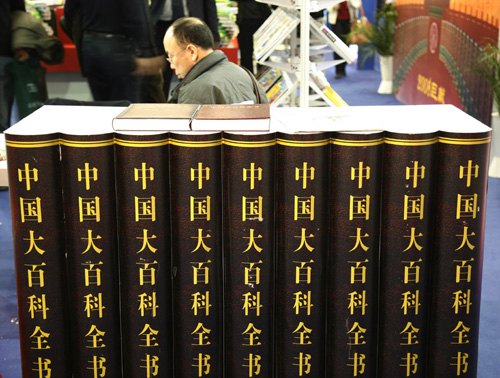|
 |
|
ARCHIVE: The China Encyclopedia on display at the Beijing Book Fair (CFP) |
Xiao mentioned the battle over the PX entry as an example. "How could the content be modified more than 30 times within a day?" Xiao asked. "How could the modifications be passed every time?"
On March 7, a woman surnamed Zou from Changshu, Jiangsu Province, wanted to transfer her money from an online shopping account to a bank account. Zou's daughter checked on Baidu Baike for the online shopping company's official telephone number. The number later turned out to be one used for fraud and Zou was cheated out of 50,000 yuan ($8,200).
"The monitoring system used by Baidu Baike is not transparent and sometimes the rules are not optimal, which results in mistakes in some of the entries," said He Yujie, a postgraduate student at the School of Information Management of Wuhan University, in his essay Open Encyclopedia.
This also affects the enthusiasm of the online users when it comes to creating and modifying the items. A survey made by iResearch.cn, a leading online research consultancy, shows that only 3 percent of users are actively editing items. "It seems to be very complicated and time consuming," a netizen using the screen-name wubingmin commented. "Even when I noticed some mistakes in the content, I would rather not take the time to change it."
Xu Guanning, a professor from Hunan University in central China, said that stable financial support and healthy profits are needed for the sound operation of an online encyclopedia. "Hudong Baike defines itself as a commercial online encyclopedia. Some companies can make advertisements in items relating to their company information but this while Baidu Baike, on the other hand, claims to be non-profit," said Xu.
Online revolution
Despite the problems, online encyclopedias enjoy great popularity, especially among young people.
"We can access any entry we want with our smartphones. It is very convenient," said Xie Yuhong, a college student from Beijing-based Renmin University of China. "And most of the time we don't require a professional standard. So it does just fine."
Xie said her father bought a physical set of the China Encyclopedia, which she keeps on a book shelf at home. "Surely it is going to be of a better quality, but it is too heavy to carry around and the content can't be updated," said Xie.
On March 14, 2012, Encyclopaedia Britannica Inc. announced that they would cease printing physical copies and focus on their online edition. This event regarded as a death knell for the printed encyclopedia.
Ma Rujun, the deputy chief editor of the China Encyclopedia revealed that they also plan to focus on their online edition.
The advantage of an online edition, according to Ma, is the combination of authority of their sources. The editing function will not be open to the public, especially professional items, which can only be edited and modified by experts to ensure the reliability of the content.
Kan Kaili, a professor from Beijing University of Posts and Telecommunications, thought that online encyclopedias will ultimately replace the traditional encyclopedia. "An online encyclopedia is the result of the collective wisdom of Internet users and the advantage of it being open and shared can't be surpassed."
Ma disagreed with Kan. "In China, the printed encyclopedia will not disappear for a long time as for some people, the printed edition means more than just the books, it is more like a precious collection," said Ma.
Email us at: yuanyuan@bjreview.com
| 